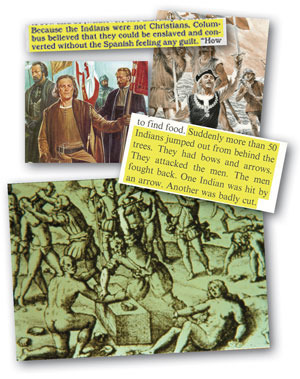"For years, I opened my 11th-grade U.S. history classes by asking students, “What’s the name of that..."
“Right. So who did he find when he came here?” I asked. Usually, a few students would say, “Indians,” but I asked them to be specific: “Which nationality? What are their names?”
Silence.
In more than 30 years of teaching U.S. history and guest-teaching in others’ classes, I’ve never had a single student say, “Taínos.” How do we explain that? We all know the name of the man who came here from Europe, but none of us knows the name of the people who were here first—and there were hundreds of thousands, if not millions, of them. Why haven’t you heard of them?
This ignorance is an artifact of historical silencing—rendering invisible the lives and stories of entire peoples.
[…] In an interview with Barbara Miner, included in Rethinking Columbus, Suzan Shown Harjo of the Morning Star Institute, who is Creek and Cheyenne, said: “As Native American peoples in this red quarter of Mother Earth, we have no reason to celebrate an invasion that caused the demise of so many of our people, and is still causing destruction today.” After all, Columbus did not merely “discover,” he took over. He kidnapped Taínos, enslaved them—“Let us in the name of the Holy Trinity go on sending all the slaves that can be sold,” Columbus wrote—and “punished” them by ordering that their hands be cut off or that they be chased down by vicious attack dogs, if they failed to deliver the quota of gold that Columbus demanded. One eyewitness accompanying Columbus wrote that it “did them great damage, for a dog is the equal of 10 men against the Indians.”
Corporate textbooks and children’s biographies of Columbus included none of this and were filled with misinformation and distortion. But the deeper problem was the subtext of the Columbus story: it’s OK for big nations to bully small nations, for white people to dominate people of color, to celebrate the colonialists with no attention paid to the perspectives of the colonized, to view history solely from the standpoint of the winners.”
-
Bill Bigelow, Rethinking Columbus: Towards a True People’s History (via professorpinka)
The context of these words is even more chilling:
This past January, almost exactly 20 years after its publication, Tucson schools banned the book I co-edited with Bob Peterson, Rethinking Columbus. It was one of a number of books adopted by Tucson’s celebrated Mexican American Studies program—a program long targeted by conservative Arizona politicians.Textbook depictions of Columbus are often filled with misinformation and distortion or are justified with references to manifest destiny. The bottom image is a woodcut by Theodor De Bry, in the 16th century, based on the writings of Bartolome de las Casas. (Photo collage: Zinn Education Project)

The school district sought to crush the Mexican American Studies program; our book itself was not the target, it just got caught in the crushing. Nonetheless, Tucson’s—and Arizona’s—attack on Mexican American Studies and Rethinking Columbus shares a common root: the attempt to silence stories that unsettle today’s unequal power arrangements.
the attempt to silence stories that unsettle today’s unequal power arrangements.
the attempt to silence stories that unsettle today’s unequal power arrangements.
the attempt to silence stories that unsettle today’s unequal power arrangements.
(via medievalpoc)



